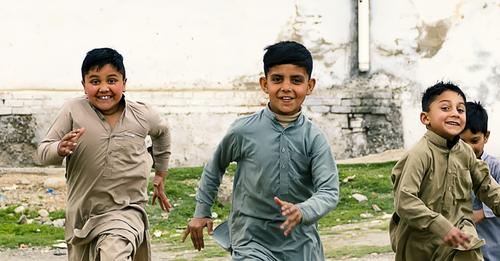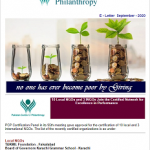Philanthropy is best understood as actions of voluntary giving that serve and benefit others without expecting any return or profit. In the words of John D. Rockefeller, “think of giving not only as a duty but as a privilege”. Donating to an extensive range of causes, and their impact on international development can bring about massive changes.
Pakistanis, both within and outside Pakistan, are considered quite generous in contributing to social causes. While considering within-country philanthropic giving, Pakistanis as a nation donate approximately 1% of their GDP to charity, similar to wealthier nations like the UK and Canada who contribute 1.3% and 1.2% respectively, and more than other countries in the region like India, which contributes 0.6%, as reported by Stanford Social Innovation Review. A national-level study on The State of Individual Philanthropy in Pakistan revealed that people donated over PKR 300 billion (US$1.8 million) in 2013-14 through giving either in cash, kind, or time-volunteerism. In the last few years, the awareness of philanthropy among the diaspora has grown, and they now contribute close to 30% of the social sector investments in Pakistan.
The impacts of diaspora philanthropy
Diaspora philanthropy is an activity by which private resources are willingly given by people outside of their countries of origin to their countries of origin with the intention of resolving community concerns and improving peoples’ welfare1. Within this perspective, diaspora populations who possess a strong sense of identity as Pakistanis or Muslims and have close bonds to their communities are thought to be key actors contributing to private social investment and to economic, cultural, and social progress in their homelands.
Presently, more than 4% of the total Pakistani population, or 9 million people, reside in 115 countries around the world2. Of these, about 28% live in the UK and wider Europe, with over 1.17 million migrants to the UK who send around US$2.02 billion back home, including remittances3. A recent study on Pakistani Diaspora Philanthropy in the UK showed that the annual philanthropic giving by the Pakistani community to various social causes was £1.25 billion (US$1.7 billion) in 2018. The most common way to donate is through monetary giving mainly to social development initiatives like health and education, with the largest amount coming from Zakat donations as a fulfilment of religious obligations, and the smallest from time volunteered in Pakistan.
The desire to support Pakistan can also be seen in countries with smaller diaspora communities. During the initial Covid-19 pandemic, the Welfare Association of Pakistan (WAP) in Tanzania gathered to donate $6,300 to the Prime Minister of Pakistan’s Covid-19 Pandemic Relief Fund-20204. The positive impact of diaspora philanthropy is already a reality and it is expected to increase as the diaspora community becomes more organised and Non-Governmental Organisations (NGOs) improve the accountability and effectiveness of their programmes through the use of diaspora funds.
Currently, there are few studies that analyse the impacts of diaspora philanthropy, but there is an increased awareness and ongoing work towards organising and channelling it more effectively towards areas of high social priority like human development, research, and building of social capital and assets that can be a game-changer for Pakistan. Many organisations, including the Pakistan Centre for Philanthropy, are working within and outside Pakistan to support mobilising philanthropic resources and channelling them into areas where they are needed the most.
Beyond cash donations: long-term possibilities of diaspora philanthropy
Monetary transfers – consisting of remittances and cash donations – are merely one component of how diasporas can contribute to their countries of origin. Many specialists consider that the diaspora population could play a noteworthy role in passing on skills/expertise, imparting technology, and maintaining strong civil relationships.
A pioneering study on the Pakistani Diaspora in the USA (2005) revealed that time volunteered vastly surpassed donations in cash and kind. The 43.5 million hours of volunteer time that Pakistani-Americans give per year add up to $750 million while cash donations represent $250 million.
The study also highlighted that philanthropy is a high-potential funding stream that can sustain civil society-led initiatives and could contribute towards attaining long-term goals like the Sustainable Development Goals (SDGs) when overseas donations are effectively allocated to national programmes that support their achievement. This year, the Pakistani government launched an initiative called Roshan Samaaji Khidma that provides an online platform for Pakistanis abroad to channel their Zakat and donations to support poverty alleviation.
The philanthropic trends of the diaspora population need to be analysed further, but they already offer a valued lens through which the rationale and motivations of giving can be assessed to give more complete answers to questions such as how much people give, why they give and to whom. More attention to diaspora philanthropy would generate awareness about its potential and eventually facilitate forming an effective policy to boost diaspora social investments and benefit Pakistan and other countries.
_________________________
1. Pakistani Diaspora Philanthropy In The UK: Trends And Variations, 2019, https://pcp.org.pk/uploads/Pakistani%20Diaspora%20Philanthropy%20in%20the%20UK.pdf
2. Migrant Resource Centre: https://www.mrc.org.pk/en/migration-network/pakistani-diaspora
3. UK Census, 2011
4. Ministry of Foreign Affairs, Government of Pakistan: http://mofa.gov.pk/welfare-association-of-pakistan/



